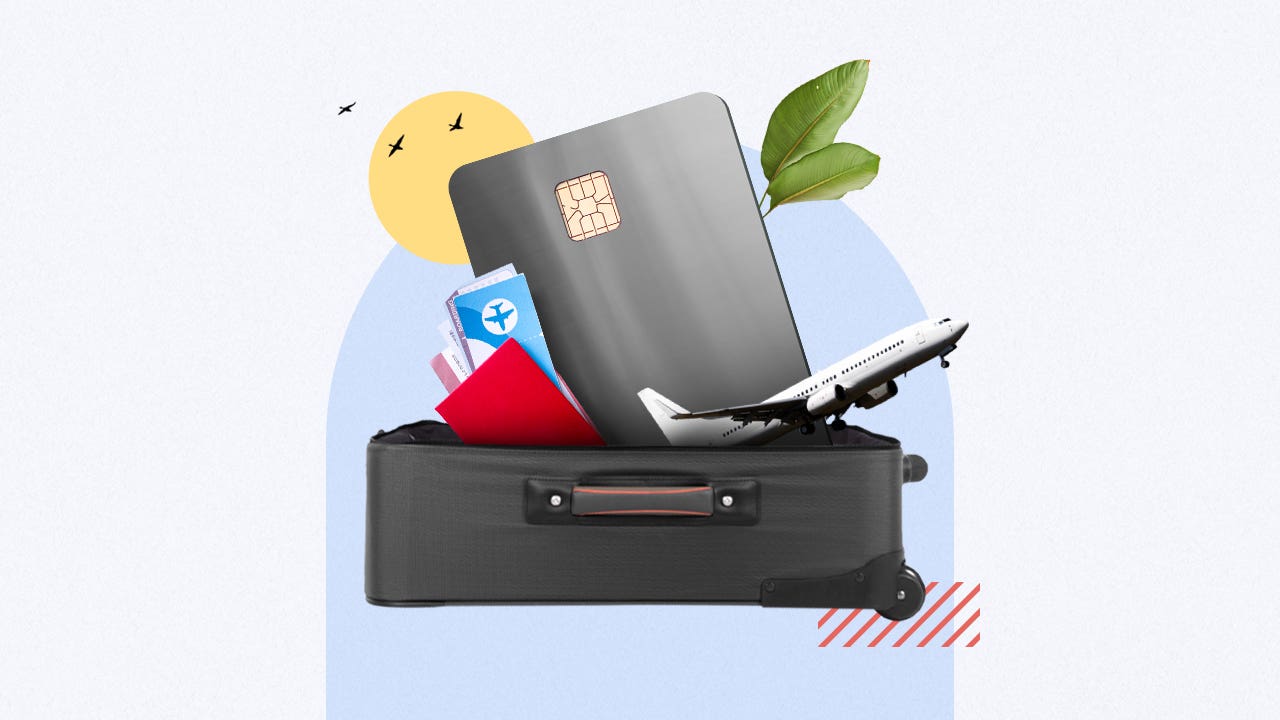How do travel credit cards work?

Key takeaways
- Travel credit cards reward many different kinds of travel and offer varied redemption opportunities.
- You’ll earn points or miles for the purchases you make with a travel card.
- You’ll typically get the most value out of your earned rewards by redeeming toward travel in your issuer’s portal or by transferring points.
Travel credit cards are a great way to rack up points or miles toward your next vacation. Typically, you’ll earn the highest rewards for eligible travel-associated purchases, such as airfare, hotel stays, transit and more. But you can also earn travel rewards on everyday purchases like those at grocery stores, gas stations and online shopping.
Depending on the type of card you have, your rewards might be tied to specific airline or hotel chains, or they may be general rewards redeemable for a wide range of travel. Find out more about travel credit cards, their benefits and how they work so that you can look forward to your next getaway.
Types of travel credit cards
Travel credit card rewards come in the form of points or miles associated with a particular rewards or travel program. For example, an American Airlines credit card will earn miles for the AAdvantage program, while a Chase card will earn points for the Chase Ultimate Rewards program.
Top travel credit cards include both flexible rewards cards and those that are co-branded with another program, such as hotel credit cards and airline credit cards.
Learn more: Beginner’s guide to credit card points
Benefits of travel credit cards
Travel cards have a lot of attractive benefits. Possibly the most attractive benefit is earning and redeeming rewards to help you budget for your next vacation. Credit cards principal writer Ana Staples uses travel cards to plan for overseas trips. She admits, “Rewards credit cards are the only reason I’m able to travel internationally.”
In addition to saving on trips, you can enjoy plenty of perks depending on the card you hold. For instance, some cards might carry some or all of these features:
- Statement credit for Global Entry or TSA PreCheck®
- Automatic elite status’
- Free upgrades
- Lounge access
- Annual credits
- Travel insurance for canceled bookings or lost baggage
Typically, travel cards with high annual fees will offer more benefits, especially those that can help offset the fee. If you are a frequent traveler, taking advantage of these perks can make traveling a richer and smoother experience.
How do travel rewards work?
The kind of travel card you have and its respective rewards program determine how you can apply those rewards. If you have a hotel or airline credit card, you can typically only redeem those points with their respective loyalty programs. However, there are more ways to redeem flexible travel rewards, like booking through your card issuer’s online travel portal or transferring your points or miles to an issuer’s travel partners.
Redeeming rewards on an issuer’s online portal
Your card issuer will typically have a portal on its website that lists redemption options and points values. Examples of redemption options include statement credits, travel purchases, gift cards and cash back. To redeem your rewards on an issuer’s online portal, simply log in to your account and locate the appropriate rewards or travel section.
Rewards programs typically use a “1 point : 1 cent” conversion rate, meaning every 100 points or miles is worth $1. Some issuers, like Chase, also offer boosted points values or other perks for travel purchases made through their online portal. To get an idea of how much your points and miles are worth, take a look at Bankrate’s points and miles valuations for an in-depth look at airline, hotel and credit card program rewards values.
Redeeming rewards by transferring to a travel partner
Some travel rewards cards let you transfer points or miles to the issuer’s travel partners, which may include frequent flyer programs or hotel loyalty programs. This is often the way to get the most value out of your travel rewards.
You can redeem travel rewards by transferring to an eligible travel partner through the issuer’s online portal. Transfer times can range from instantly to a few days — so plan ahead. Once you transfer points or miles from an issuer to a travel partner, you won’t be able to transfer them back to the issuer.
After you’ve transferred your points, you can book travel directly through the airline or hotel’s own loyalty program and your credit card issuer is no longer involved in the process.
Other ways to redeem points and miles
Some credit cards allow you to redeem your points and miles for things like statement credits, cash back, gift cards or other merchandise. This is usually the least valuable way to redeem your points and miles so you’d be better off using them towards travel most times.
How to choose a travel rewards card
Ultimately, your spending habits, goals, finances and credit history will determine which travel card works best for you. This may require some self-reflection and an assessment of your financial situation to find the right travel card. Review these factors to get clear on which travel card would work best for you:
- Travel preferences: Do you prefer using one specific airline or hotel chain when you travel? Or would you rather have the freedom to use your points on whichever hotel and flight you choose? For loyalty-based rewards, go for a co-branded travel card. If you prefer flexibility, general travel cards will give you more options.
- Spending habits: What do you spend the most money on? One of the best ways to choose a travel card is to find one that offers the highest rewards for the categories where you spend most.
- Welcome offers: You may find sign-up bonuses for travel credit cards that offer extra rewards for meeting purchase requirements within a certain timeframe. As long as you’re able to comfortably meet the spending requirements, a bonus offer could be a deciding factor.
- Credit history: Like most credit cards, applying for a travel rewards card means a hard credit check to determine eligibility. If you know where your credit score stands, it’s best to choose travel rewards cards that fit your credit profile to avoid unnecessary denials and credit inquiries. For cards that match your credit, use Bankrate’s CardMatch™ tool.
-
Annual fee: There are plenty of travel credit cards with no annual fee if that’s what works for your budget. While some may prefer to avoid the annual fee, some cards with annual fees are worth it thanks to extra perks and benefits.
Travel rewards cards for beginners
When you’re ready to earn rewards, it’s best to start with a beginner-friendly travel card so you can get the hang of things. Here are our picks for beginner travel rewards credit cards:
- Discover it® Miles. Earn unlimited 1.5X miles on all of your purchases without an annual fee. With a simple rewards structure and a mile-for-mile match on all of the miles you earn at the end of your first year, you’ll find plenty of ways to make the most of this flexible travel rewards card.
- Capital One Venture Rewards Credit Card. Get flexible travel rewards that are easy to use and understand, for a modest $95 annual fee. Earn 2X miles on everyday purchases and 5X miles on hotels, vacation rentals and rental cars booked through the Capital One Travel portal.
- Bilt Mastercard®. If you want to earn travel rewards by paying your rent, the Bilt Mastercard has you covered. Earn 1X points on rent (up to 100,000 points each calendar year) without any transaction fees, 2X points on travel (booked directly with airlines, hotels, car rental agencies, cruise lines, or through the Bilt Travel Portal), 5X points on Lyft and Bilt Neighborhood Dining Partners and 3X on dining. Plus, you’ll access exclusive benefits on the first of every month as part of Bilt’s monthly “Rent Day” promotions.
- Chase Sapphire Preferred® Card. If you’re looking for your first travel credit card, but it’s not your first time using a credit card, the Sapphire Preferred offers tons of cardholder perks and high rewards on travel and everyday categories like dining. For $95 per year, you’ll benefit from a $50 annual hotel credit through the Chase Travel portal, a solid lineup of travel protections and 25 percent more value when you redeem your points through Chase Travel.
These might not be your forever cards, but they’re a good starting point for learning how travel credit cards work. They’ll also help you get familiar with earning, redeeming and eventually maximizing travel rewards.
The bottom line
Using a travel rewards credit card can help you elevate your travel experiences by earning points or miles from your purchases. When you choose a travel card that aligns with your budget and goals, it can significantly reduce your travel costs or provide perks that enhance your trip. There’s a learning curve to using a travel card, but once you get the hang of it, you may be surprised by how much you can accomplish with your redemptions.
To make sure a travel credit card is ultimately worth it for you, be sure to select a card that rewards you for the type of purchases you make most often or the categories you spend the most in. Ideally, it won’t charge a fee that costs more than you’ll earn in rewards. If you’re ready to jump into the travel rewards lifestyle and start earning points toward your next trip, take a look at the best travel rewards cards to make your decision a little easier.
Why we ask for feedback Your feedback helps us improve our content and services. It takes less than a minute to complete.
Your responses are anonymous and will only be used for improving our website.










